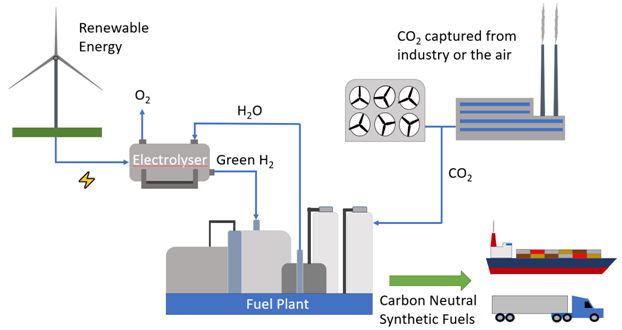 It’s a known fact that emissions from gas-powered vehicles are harming the atmosphere.
It’s a known fact that emissions from gas-powered vehicles are harming the atmosphere.
In response to this Porsche, the German sports car company, began producing e-fuel as a pilot program in Chile last year. Currently, the fuel will be used exclusively in sports cars at Porsche’s performance and experience centers. The pilot program is expected to produce roughly 34,342 gallons of e-fuel, with the goal of producing around 145.3 million gallons within the next few years.
So what are e-fuels? How do they work? Let’s find out…
What Are E-fuels?
E-Fuels, also called synthetic fuels, are made by passing electricity through water. The electricity separates the hydrogen and oxygen molecules. The hydrogen is then mixed with carbon dioxide to produce a liquid e-fuel.
E-fuel can be produced using many renewable energy sources, such as solar and wind. E-fuel mimics the chemical structure of gasoline, making it possible for gas-powered cars to run on e-fuels with little to no modification.
What Are The Benefits?
 E- fuels can help ease the transition away from gas-powered cars, for those who may not be able to afford EVs. It will also help to reduce waste by keeping gas-powered cars in service, instead of scrapping them prematurely.
E- fuels can help ease the transition away from gas-powered cars, for those who may not be able to afford EVs. It will also help to reduce waste by keeping gas-powered cars in service, instead of scrapping them prematurely.
Additionally, the use of e-fuels will not require new infrastructure to be built - unlike EVs. Existing gas stations and cars will be able to stay in use, which is already a big saving.
What Are The Concerns?
Despite the many benefits, opinions differ on whether e-fuels are truly eco-friendly. E-fuels are widely said to be nearly carbon neutral, although an independent study asserts that e-fuels emit the same amount of CO2 as gasoline. Since e-fuels are still being developed and tested, their true impacts are still unknown.
E-fuels are very expensive to produce, partly due to energy loss during production. Unfortunately, only about half of the energy used in producing e-fuels is actually converted into fuel. Additionally, only about 16% of the energy used in e-fuel production is actually used to power the car. Whereas, about 70% of energy is preserved when powering an EV. It’s argued that it would be more economical to use e-fuels in planes and boats in order to reserve limited green energy sources for powering homes.
Even though the use of e-fuels will preserve existing infrastructure, it will still take time and money to integrate it into everyday life. Currently, the price of e-fuel is nearly double the cost of regular fuel.
In Conclusion
The jury is still out, and e-fuels are still a work in progress. Though opinions are divided on E-fuels, with more testing and development, they may be another way to help fight against the climate crisis. With the help of both e-fuels and EVs, hopefully, our transportation systems will soon be carbon-free!
The video below discusses the pros and cons of this emerging technology.
Sources: CNBC, Porsche, The ICCT, efuel-alliance.eu, transportenvironment.org







